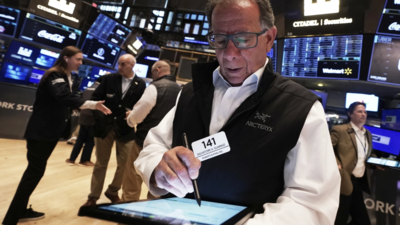US markets open flat after 3 day gain amid looming trade tensions

US stock markets opened lower on Thursday, with the major indices showing modest declines following a brief rebound earlier in the week. Investors are weighing corporate earnings results against global economic concerns, keeping market sentiment cautious.
At the opening bell, the Dow Jones Industrial Average stood at 40,031.61, down by 61.79 points, or 0.15%. The Nasdaq followed with a slight dip of 4.46 points, or 0.03%, bringing it to 17,161.58. The S&P 500 was also down 1.6 points, or 0.03%, settling at 5,483.17.
Gold and oil prices also faced declines, with gold dropping by 1.85% to $3,286.50, reflecting investor caution. Oil futures slid by 0.89%, with a barrel of crude trading at $62.23.
The US 10-year Treasury yield fell to 4.274%, marking a 0.72% decline, signalling a pullback in investor confidence. Meanwhile, the euro slipped against the dollar, trading at 1.134, down by 0.465%.
Despite the slight downturn at the open, the volatility index (VIX) climbed by 0.94%, reaching 26.72, indicating some nervousness in the market. Investors are keeping a close eye on ongoing corporate earnings reports and the potential for future Federal Reserve actions on interest rates, which continue to shape market expectations.
Meanwhile, Futures for the S&P 500 fell by 0.1%, futures for the Dow Jones Industrial Average dropped 0.4%, and Nasdaq futures also ticked down 0.1%.
The slight downturn followed three straight days of gains, driven by strong corporate earnings and hopes that the Federal Reserve might cut interest rates.
Alphabet’s shares jumped 5% overnight after the company, Google’s parent, reported a 50% surge in its first-quarter profit. These stellar results came even as Google faced competitive and legal challenges amid a global trade war. Prior to Friday’s after-hours surge, Alphabet’s shares had fallen by 16% since the end of the previous year.
On the downside, Intel’s shares fell by 6.8% in premarket trading, despite the company surpassing Wall Street’s quarterly projections. The company issued a cautious outlook for 2025, citing an increasingly uncertain economic landscape marked by shifting trade policies, persistent inflation, and rising regulatory risks.
Since President Donald Trump took office in January, market volatility has often been triggered by his tariff announcements, which were sometimes reversed or paused. Although companies have largely reported strong earnings, many have cut or withdrawn their annual guidance, citing uncertainty surrounding Trump’s trade policies.
In Europe, midday trading saw Paris’s CAC 40 up 0.7%, Germany’s DAX rising 0.4%, and the British FTSE 100 unchanged after better-than-expected retail sales in March.
In Asia, Tokyo’s Nikkei 225 surged 1.9% to 35,705.74, and South Korea’s Kospi gained 0.9% to 2,546.15. Hong Kong’s Hang Seng picked up 0.3% to 21,980.74, while Shanghai’s Composite Index edged down 0.1% to 3,295.06.
The rally in global markets was fueled by hopes that Trump was softening his stance on tariffs and his criticism of the Federal Reserve. However, China denied reports that it was in active trade negotiations with the US
In China, tech stocks saw gains after some semiconductor import companies were said to have been quietly exempted from the country’s 125% retaliatory tariffs on US chips. Lenovo Group rose 3.4%, and Chinese search engine company Baidu added 3.9%. However, shares of China’s largest semiconductor foundry, Semiconductor Manufacturing International Corporation, dropped by 2.8%.
Taiwan’s Taiex added 2%, while India’s Sensex fell 0.4% due to heightened tensions with Pakistan over the Pahalgam terror attack.
Australia’s market was closed on Friday for Anzac Day.
Meanwhile, US benchmark crude oil fell by 80 cents to $61.99 per barrel in electronic trading on the New York Mercantile Exchange. Brent crude, the international benchmark, dropped 81 cents to $64.84 per barrel.
The US dollar strengthened to 143.29 Japanese yen from 142.69 yen, while the euro dipped slightly to $1.1363 from $1.1391.





